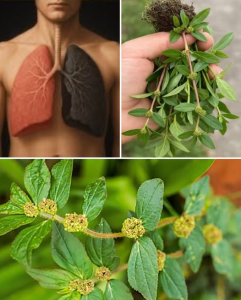
Euphorbia Hirta: A Miraculous Herb with Multifaceted Benefits
In the realm of natural medicine, few herbs hold as much promise and historical reverence as Euphorbia hirta, often known as asthma weed, snake weed, or tawa-tawa in the Philippines. Found commonly in tropical and subtropical regions, especially in Asia and Africa, this seemingly modest plant has earned a reputation for its powerful healing capabilities.
Despite its unassuming appearance—small green leaves, fine hairs, and tiny clustered flowers—Euphorbia hirta is anything but ordinary. It has been celebrated for centuries in traditional medicine systems like Ayurveda, Traditional Chinese Medicine (TCM), and various indigenous healing practices. Today, modern science is beginning to catch up, validating many of its traditional uses.
Let’s explore the multifaceted benefits, uses, and potential precautions surrounding this remarkable herb.
🌿 Botanical Profile
-
Scientific Name: Euphorbia hirta
-
Family: Euphorbiaceae
-
Common Names: Asthma weed, Tawa-Tawa, Snake weed, Garden spurge
-
Habitat: Found abundantly in open grasslands, roadsides, and fields
-
Plant Description: Small annual herb, often reddish or purplish in stem color, with a milky latex and hairy stems and leaves.
🌬️ Respiratory Relief – Especially Asthma and Bronchitis
One of the most common traditional uses of Euphorbia hirta is in the treatment of asthma and other respiratory ailments. This is how it earned the name “asthma weed.”
-
It acts as a bronchodilator, helping to widen the airways and ease breathing.
-
The herb has antihistamine properties that can reduce inflammation and allergic reactions.
-
It also has mild expectorant effects, helping to clear mucus from the lungs.
In many Southeast Asian countries, Euphorbia hirta is brewed into teas or decoctions to manage coughing, wheezing, and other respiratory discomforts.
🦠 Potent Antiviral and Antibacterial Properties
Modern studies have demonstrated that extracts from Euphorbia hirta possess strong antimicrobial activity.
-
It has shown effectiveness against various bacteria, including Escherichia coli, Staphylococcus aureus, and Salmonella typhi.
-
It also has antiviral potential, particularly against herpes simplex viruses and dengue virus.
This has made it especially popular in dengue-endemic regions like the Philippines, where it is often used as a folk remedy to help increase platelet counts in dengue fever patients—a benefit which, while not universally proven in large-scale clinical trials, continues to draw interest from researchers and practitioners alike.
🩸 Supports Circulatory and Platelet Health
One of the most widely known uses of Euphorbia hirta in recent years has been its role in managing dengue fever, a mosquito-borne illness that can cause dangerously low platelet levels.
-
Folk practitioners claim that tawa-tawa tea (prepared from Euphorbia hirta) helps stabilize platelet counts.
-
Anecdotal evidence and some small-scale studies suggest it may improve blood coagulation and vascular integrity.
Though more robust scientific validation is needed, its role in traditional recovery protocols cannot be ignored.
🤒 Fever and Inflammation Relief
The herb has traditionally been used to reduce fevers, especially those caused by infections.
-
Contains flavonoids and polyphenols, which have known anti-inflammatory effects.
-
Can act similarly to natural NSAIDs (non-steroidal anti-inflammatory drugs) but without the synthetic chemical burden on the body.
In both topical and internal preparations, it has been used for skin infections, insect bites, and inflammatory skin conditions.
💩 Gut Health and Digestive Support
Euphorbia hirta plays a surprising role in digestive health:
-
Antidiarrheal: The herb’s astringent properties help reduce diarrhea, particularly in cases of microbial infection.
-
Anthelmintic: It can help expel intestinal worms.
-
Stomachache Relief: Its mild sedative and anti-spasmodic properties can soothe gut cramps.
People in rural communities have long used it as a go-to remedy for sudden digestive upsets or parasitic issues.
🧠 Nervous System and Sedative Properties
This herb also interacts with the central nervous system in subtle but beneficial ways.
-
Traditional texts mention its use as a mild sedative or calming agent.
-
It has been used to ease anxiety, mild insomnia, and even nervous exhaustion.
In animal studies, Euphorbia hirta showed anxiolytic (anti-anxiety) effects, opening doors for future research into its use in mental health.
🌿 How to Use Euphorbia Hirta
1. Tawa-Tawa Tea (Infusion):
-
Boil cleaned, fresh or dried leaves and stems in water for 10–15 minutes.
-
Strain and drink once cooled. Commonly used for dengue or respiratory ailments.
2. Powder Form:
-
Dried leaves can be ground into a powder and taken in small doses with honey or water.
3. Tincture/Extract:
-
Alcohol-based extracts are available in some herbal markets and used for stronger medicinal effects.
4. Topical Application:
-
Poultices of crushed leaves are applied to wounds, boils, or rashes.
⚠️ Precautions and Side Effects
Despite its many benefits, Euphorbia hirta must be used with caution.
-
The milky latex can be irritating to the skin and eyes.
-
High doses may cause vomiting, diarrhea, or drowsiness.
-
Pregnant women and young children should avoid internal use without medical supervision.
-
Always ensure proper identification of the plant; several Euphorbia species look similar but may be toxic.
As with any herb, consulting a qualified healthcare provider or herbalist before use is highly recommended—especially if you are on medications or have underlying health conditions.
🔬 Scientific Interest and Modern Research
Euphorbia hirta continues to intrigue researchers worldwide. Studies are focusing on its:
-
Antioxidant potential
-
Immunomodulatory effects
-
Cancer-fighting compounds
-
Use in integrative medicine models
With more rigorous clinical trials, this herb could someday become a part of official medical treatments for infections, inflammatory conditions, and even immune disorders.
🌏 Cultural Significance and Legacy
In countries like the Philippines, India, and Nigeria, Euphorbia hirta is more than just a weed—it’s a lifeline. During dengue outbreaks, tawa-tawa is often the first line of support in communities where hospitals are overwhelmed or inaccessible.
Its presence in ancient Ayurvedic and African pharmacopeias shows just how deeply rooted its value is across continents and cultures.
✅ Final Thoughts
Euphorbia hirta is a remarkable herb—humble in appearance, yet powerful in potential. With benefits that touch nearly every system of the human body, from the lungs to the liver, the gut to the brain, it truly earns its title as a miraculous plant in the world of herbal medicine.
Whether you’re exploring natural remedies, supporting immune health, or simply curious about botanical marvels, Euphorbia hirta is a green ally worth knowing—and respecting.
As always, nature gives us extraordinary tools. It’s up to us to understand them wisely.
